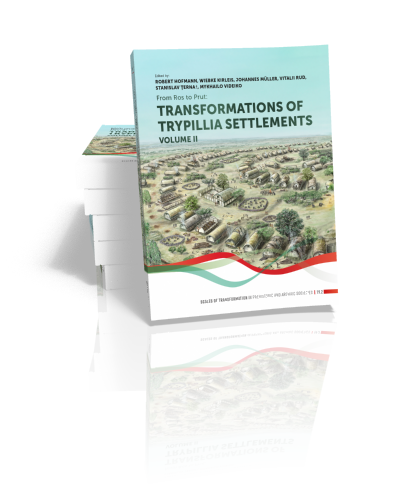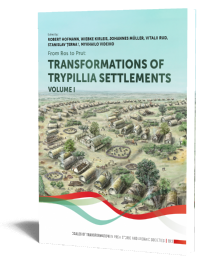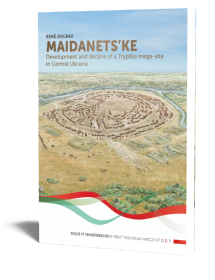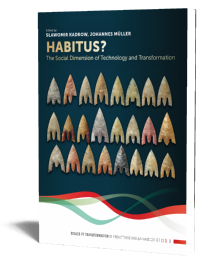From Ros to Prut (volume 2)
Transformations of Trypillia settlements
Edited by Robert Hofmann, Wiebke Kirleis, Johannes Müller, Vitalii Rud, Stanislav Ţerna†, Mykhailo Videiko | 2025

From Ros to Prut (volume 2)
Transformations of Trypillia settlements
Edited by Robert Hofmann, Wiebke Kirleis, Johannes Müller, Vitalii Rud, Stanislav Ţerna†, Mykhailo Videiko | 2025
Paperback ISBN: 9789464270754 | Hardback ISBN: 9789464270761 | Imprint: Sidestone Press Academics | Format: 210x280mm | 456 pp. | Scales of Transformation 19.2 | Series: Scales of Transformation | Language: English | 6 illus. (bw) | 308 illus. (fc) | Keywords: prehistoric archaeology; Trypillia; Chalcolithic; Mega-sites; Settlement Pattern; geophysics; geoarchaeology; archaeobotany; archeozoology; material culture; Ukraine | download cover | DOI: 10.59641/kao351dm | CC-license: CC BY 4.0
Read online or downloaded 549 times
-
Digital & Online access
This is a full Open Access publication, click below to buy in print, browse, or download for free.
-
Buy via Sidestone (EU & UK)
-
Buy via our Distributors (WORLD)
For non-EU or UK destinations you can buy our books via our international distributors. Although prices may vary this will ensure speedy delivery and reduction in shipping costs or import tax. But you can also order with us directly via the module above.
UK international distributor
USA international distributor
-
Bookinfo
Paperback ISBN: 9789464270754 | Hardback ISBN: 9789464270761 | Imprint: Sidestone Press Academics | Format: 210x280mm | 456 pp. | Scales of Transformation 19.2 | Series: Scales of Transformation | Language: English | 6 illus. (bw) | 308 illus. (fc) | Keywords: prehistoric archaeology; Trypillia; Chalcolithic; Mega-sites; Settlement Pattern; geophysics; geoarchaeology; archaeobotany; archeozoology; material culture; Ukraine | download cover | DOI: 10.59641/kao351dm | CC-license: CC BY 4.0
Read online or downloaded 549 times

We will plant a tree for each order containing a paperback or hardback book via OneTreePlanted.org.
Pre-dating the urban revolution in Western Asia, a network of agricultural settlements developed in the forest-steppe zone northwest of the Black Sea in the late 5th and first half of the 4th millennium BCE, some of which are among the largest prehistoric mega-sites in Europe. These enormous so-called Trypillia communities are unique in many respects, and the dynamics of their formation and their development have long been a topic of intensive research. For more than ten years now, research on the transformations of these Chalcolithic societies has been conducted as a Ukrainian-Moldavian-German cooperation. This research does not only focus on some of the largest mega-sites, but also attempts to reconstruct the dynamics of mega-site processes and their economic, social and ideological foundations in different perspectives – local, regional and interregional. Although our research is not yet complete, it is already clear that the emergence of Trypillia mega-sites represented the preliminary culmination of a regionally differentiated and widely interconnected process of settlement formation in the area between the Prut and Ros rivers. These processes were, on the one hand, closely interwoven with Copper Age societies of Southeast Europe and, on the other hand, ushered in the transition to the era characterised by higher settlement mobility.
This volume brings together archaeological, geophysical, archaeobotanical, archaeozoological and geoarchaeological contributions on economy, settlement patterns, material culture and dating from three different test regions in the territory of present-day Ukraine and Moldova. The presentation of our new data contributes decisively to a better understanding of both the enormous variability of settlement trajectories characterising this vast area and to connecting developments throughout time.
Volume 2 contains contributions on the interfluves of the Southern Bug and Dniester, and the Dniester and Prut. Additionally, it provides regionally overarching insights.
BUG-DNIESTER INTERFLUVE (REGION B)
14. Tracing Trypillia transformations in the Southern Bug – Dniester interfluve: Archaeological explorations in the Kryzhopil microregion, Ukraine
Vitalii Rud, Robert Hofmann, Viktor Kosakivskyi, Olha Zaitseva, Johannes Müller
15. Cult objects from Trypillia settlements of the Vinnitsa Region
Natalia Burdo, Vitalii Rud, Robert Hofmann
PRUT-DNIESTER INTERFLUVE (REGION C)
16. Pits as durable narratives – Results of the 2019 excavation campaign in the Trypillia settlement Stolniceni 1, Moldova
Stanislav Ţerna, Andreea Ţerna, Robert Hofmann, Mariana Vasilache, Marta Dal Corso, Yevhenii Sliesariev, Wiebke Kirleis, Johannes Müller
17. Putineşti 3 and Trinca: Geophysical investigation of middle and late Trypillia settlements in Moldova
Robert Hofmann, Stanislav Ţerna, Ghenadie Sirbu, Liudmyla Shatilo, Vitalii Rud
18. Trypillia settlements after mega-sites: Archaeological and geophysical Investigations in the Cunicea micro-region, Prut-Dniester interfluve
Stanislav Ţerna, Robert Hofmann, Liudmyla Shatilo, Vitalii Rud
TRYPILLIA MACROSCALE
19. Radiocarbon dating: Trypillia detailed chronology, house duration estimates and the contemporaneity of earliest European mega-sites
Johannes Müller, Robert Hofmann, Wiebke Kirleis, Mila Shatilo, Frank Schlütz, Miha Videika, Vitali Rud, Stanislav Terna, Andrea Terna
20. Ring-shaped settlement plans and Trypillia population agglomeration
Robert Hofmann, Liudmyla Shatilo, Knut Rassmann, Vitalii Rud, Stanislav Ţerna, Stefan Dreibrodt, Vladislav Chabanyuk, Wiebe Kirleis, Johannes Müller
CONCLUSION
21. Transformations of Trypillia settlements
Johannes Müller, Robert Hofmann, Wiebke Kirleis, Mila Shatilo, Frank Schlütz, Miha Videika, Vitali Rud, Stanislav Terna, Andrea Terna
Dr. Robert Hofmann
Robert Hofmann is a researcher at the Institute for Prehistoric and Protohistoric Archaeology at Kiel University, Germany. After early beginnings in a school club of ‘young archaeologists’ and several years of working in a county archaeological research unit, he studied Prehistoric and Protohistoric Archaology at the Free University of Berlin between 1998 and 2005 (Magister 2005) and completed his PhD in 2011 at Kiel University.
Dr. Vitalii Rud
Vitalii Rud (1990) is a researcher at the Institute of Archaeology of the National Academy of Sciences of Ukraine, Department of Eneolithic and Bronze Age Archaeology. He has worked there since he was awarded his Master’s degree in Ancient History and Archaeology of Ukraine in 2012 at the National University of “Kyiv-Mohyla Academy”. In 2018 he was awarded a PhD for his thesis concerning Trypillia communities in the Dniester and Southern Bug interfluve in Ukraine in the beginning of IV mill. BC. Rud is also a researcher at the Department of Archaeology at Kyiv Borys Grinchenko University, and in 2018 he briefly worked at the Institute for Prehistoric and Protohistoric Archaeology at Kiel University, Germany.
Stanislav Ţerna†
Stanislav Țerna was a researcher at the “High Anthropological School” University, and previously at the Center for Archaeology, Institute of Cultural Heritage of the Moldovan Academy of Sciences, in Chișinău, Republic of Moldova. His area of research interest was the Copper Age of the north-west Black Sea region, focusing mainly on the settlement structure, anthropomorphic figurines, architecture and social organisation of the Cucuteni-Trypillia societies. He conducted excavations on LBK and Trypillia settlements in Moldova, of which the most important are those at Stolniceni I and Nicolaevca. He died in 2020, at the time when he was undertaking a PhD at the Institute of Prehistoric and Protohistoric Archaeology, Kiel University, within the CRC 1266 subproject “Population agglomeration at Tripolye-Cucuteni mega-sites”.

Prof. Dr. Wiebke Kirleis
Wiebke Kirleis is professor of environmental archaeology/archaeobotany at Kiel University, Germany. She is deputy director of the Collaborative Research Centre ‘Scales of Transformation: Human–Environmental Interaction in Prehistoric and Archaic Societies’ (CRC 1266, financed by the German Research Foundation/DFG) and a member of the Cluster of Excellence ‘Roots’ at Kiel University.

Prof. dr. Johannes Müller
Johannes Müller (PhD, University of Freiburg, 1990) is a Professor and Director of the Institute for Prehistoric and Protohistoric Archaeology at Kiel University, Germany. He is the founding director of the Johanna Mestorf Academy, Speaker of the Collaborative Research Centre “Scales of Transformation: Human-environmental Interaction in Prehistoric and Archaic Societies”and of the Excellence Cluster “ROOTS – Social, Environmental, and Cultural Connectivity in Past Societies”.
Prof. Dr. Mykhailo Videiko
Mykhailo Videiko is Professor at the Borys Grinchenko Kyiv University. His interests include the prehistory of Europe, archaeological manifestations of early urbanization, archaeology of Ukraine. He is the author of Ukraine: from Trypillia to Rus (2010), A comprehensive study of large settlements of the Trypillia Culture. V-IV millennia BC (2013), and South-Eastern and Central Europe in the V-IV millennia BC (2015), as well as co-editor (with N.Burdo and S.Liashko) of Encyclopedia of Trypillia civilization (2004), among other books. He has carried out fieldwork in Ukraine, Moldova and Poland.
Abstract:
Pre-dating the urban revolution in Western Asia, a network of agricultural settlements developed in the forest-steppe zone northwest of the Black Sea in the late 5th and first half of the 4th millennium BCE, some of which are among the largest prehistoric mega-sites in Europe. These enormous so-called Trypillia communities are unique in many respects, and the dynamics of their formation and their development have long been a topic of intensive research. For more than ten years now, research on the transformations of these Chalcolithic societies has been conducted as a Ukrainian-Moldavian-German cooperation. This research does not only focus on some of the largest mega-sites, but also attempts to reconstruct the dynamics of mega-site processes and their economic, social and ideological foundations in different perspectives – local, regional and interregional. Although our research is not yet complete, it is already clear that the emergence of Trypillia mega-sites represented the preliminary culmination of a regionally differentiated and widely interconnected process of settlement formation in the area between the Prut and Ros rivers. These processes were, on the one hand, closely interwoven with Copper Age societies of Southeast Europe and, on the other hand, ushered in the transition to the era characterised by higher settlement mobility.
This volume brings together archaeological, geophysical, archaeobotanical, archaeozoological and geoarchaeological contributions on economy, settlement patterns, material culture and dating from three different test regions in the territory of present-day Ukraine and Moldova. The presentation of our new data contributes decisively to a better understanding of both the enormous variability of settlement trajectories characterising this vast area and to connecting developments throughout time.
Volume 2 contains contributions on the interfluves of the Southern Bug and Dniester, and the Dniester and Prut. Additionally, it provides regionally overarching insights.
Contents
BUG-DNIESTER INTERFLUVE (REGION B)
14. Tracing Trypillia transformations in the Southern Bug – Dniester interfluve: Archaeological explorations in the Kryzhopil microregion, Ukraine
Vitalii Rud, Robert Hofmann, Viktor Kosakivskyi, Olha Zaitseva, Johannes Müller
15. Cult objects from Trypillia settlements of the Vinnitsa Region
Natalia Burdo, Vitalii Rud, Robert Hofmann
PRUT-DNIESTER INTERFLUVE (REGION C)
16. Pits as durable narratives – Results of the 2019 excavation campaign in the Trypillia settlement Stolniceni 1, Moldova
Stanislav Ţerna, Andreea Ţerna, Robert Hofmann, Mariana Vasilache, Marta Dal Corso, Yevhenii Sliesariev, Wiebke Kirleis, Johannes Müller
17. Putineşti 3 and Trinca: Geophysical investigation of middle and late Trypillia settlements in Moldova
Robert Hofmann, Stanislav Ţerna, Ghenadie Sirbu, Liudmyla Shatilo, Vitalii Rud
18. Trypillia settlements after mega-sites: Archaeological and geophysical Investigations in the Cunicea micro-region, Prut-Dniester interfluve
Stanislav Ţerna, Robert Hofmann, Liudmyla Shatilo, Vitalii Rud
TRYPILLIA MACROSCALE
19. Radiocarbon dating: Trypillia detailed chronology, house duration estimates and the contemporaneity of earliest European mega-sites
Johannes Müller, Robert Hofmann, Wiebke Kirleis, Mila Shatilo, Frank Schlütz, Miha Videika, Vitali Rud, Stanislav Terna, Andrea Terna
20. Ring-shaped settlement plans and Trypillia population agglomeration
Robert Hofmann, Liudmyla Shatilo, Knut Rassmann, Vitalii Rud, Stanislav Ţerna, Stefan Dreibrodt, Vladislav Chabanyuk, Wiebe Kirleis, Johannes Müller
CONCLUSION
21. Transformations of Trypillia settlements
Johannes Müller, Robert Hofmann, Wiebke Kirleis, Mila Shatilo, Frank Schlütz, Miha Videika, Vitali Rud, Stanislav Terna, Andrea Terna
Dr. Robert Hofmann
Robert Hofmann is a researcher at the Institute for Prehistoric and Protohistoric Archaeology at Kiel University, Germany. After early beginnings in a school club of ‘young archaeologists’ and several years of working in a county archaeological research unit, he studied Prehistoric and Protohistoric Archaology at the Free University of Berlin between 1998 and 2005 (Magister 2005) and completed his PhD in 2011 at Kiel University.
Dr. Vitalii Rud
Vitalii Rud (1990) is a researcher at the Institute of Archaeology of the National Academy of Sciences of Ukraine, Department of Eneolithic and Bronze Age Archaeology. He has worked there since he was awarded his Master’s degree in Ancient History and Archaeology of Ukraine in 2012 at the National University of “Kyiv-Mohyla Academy”. In 2018 he was awarded a PhD for his thesis concerning Trypillia communities in the Dniester and Southern Bug interfluve in Ukraine in the beginning of IV mill. BC. Rud is also a researcher at the Department of Archaeology at Kyiv Borys Grinchenko University, and in 2018 he briefly worked at the Institute for Prehistoric and Protohistoric Archaeology at Kiel University, Germany.
Stanislav Ţerna†
Stanislav Țerna was a researcher at the “High Anthropological School” University, and previously at the Center for Archaeology, Institute of Cultural Heritage of the Moldovan Academy of Sciences, in Chișinău, Republic of Moldova. His area of research interest was the Copper Age of the north-west Black Sea region, focusing mainly on the settlement structure, anthropomorphic figurines, architecture and social organisation of the Cucuteni-Trypillia societies. He conducted excavations on LBK and Trypillia settlements in Moldova, of which the most important are those at Stolniceni I and Nicolaevca. He died in 2020, at the time when he was undertaking a PhD at the Institute of Prehistoric and Protohistoric Archaeology, Kiel University, within the CRC 1266 subproject “Population agglomeration at Tripolye-Cucuteni mega-sites”.

Prof. Dr. Wiebke Kirleis
Wiebke Kirleis is professor of environmental archaeology/archaeobotany at Kiel University, Germany. She is deputy director of the Collaborative Research Centre ‘Scales of Transformation: Human–Environmental Interaction in Prehistoric and Archaic Societies’ (CRC 1266, financed by the German Research Foundation/DFG) and a member of the Cluster of Excellence ‘Roots’ at Kiel University.

Prof. dr. Johannes Müller
Johannes Müller (PhD, University of Freiburg, 1990) is a Professor and Director of the Institute for Prehistoric and Protohistoric Archaeology at Kiel University, Germany. He is the founding director of the Johanna Mestorf Academy, Speaker of the Collaborative Research Centre “Scales of Transformation: Human-environmental Interaction in Prehistoric and Archaic Societies”and of the Excellence Cluster “ROOTS – Social, Environmental, and Cultural Connectivity in Past Societies”.
Prof. Dr. Mykhailo Videiko
Mykhailo Videiko is Professor at the Borys Grinchenko Kyiv University. His interests include the prehistory of Europe, archaeological manifestations of early urbanization, archaeology of Ukraine. He is the author of Ukraine: from Trypillia to Rus (2010), A comprehensive study of large settlements of the Trypillia Culture. V-IV millennia BC (2013), and South-Eastern and Central Europe in the V-IV millennia BC (2015), as well as co-editor (with N.Burdo and S.Liashko) of Encyclopedia of Trypillia civilization (2004), among other books. He has carried out fieldwork in Ukraine, Moldova and Poland.
-
Digital & Online access
This is a full Open Access publication, click below to buy in print, browse, or download for free.
-
Buy via Sidestone (EU & UK)
-
Buy via our Distributors (WORLD)
For non-EU or UK destinations you can buy our books via our international distributors. Although prices may vary this will ensure speedy delivery and reduction in shipping costs or import tax. But you can also order with us directly via the module above.
UK international distributor
USA international distributor
- Browse all books by subject
-
Search all books

We will plant a tree for each order containing a paperback or hardback book via OneTreePlanted.org.
You might also like:
© 2026 Sidestone Press KvK nr. 28114891 Privacy policy Sidestone Newsletter Terms and Conditions (Dutch)








